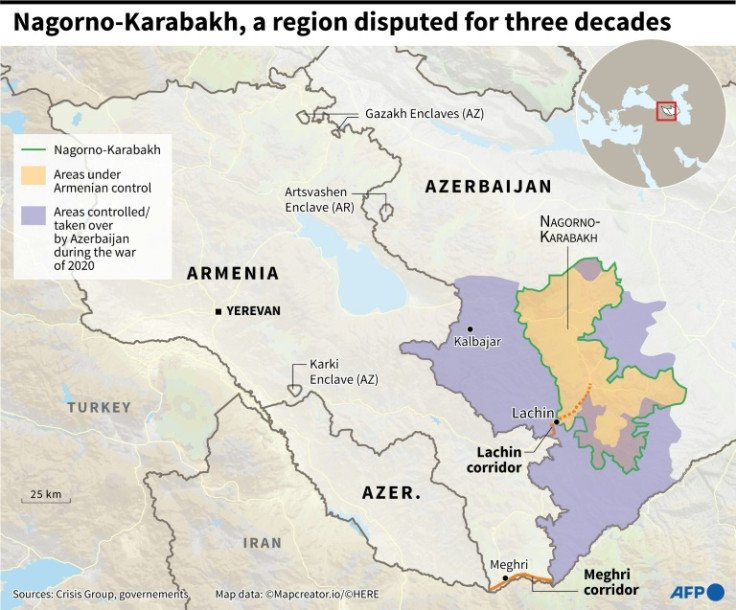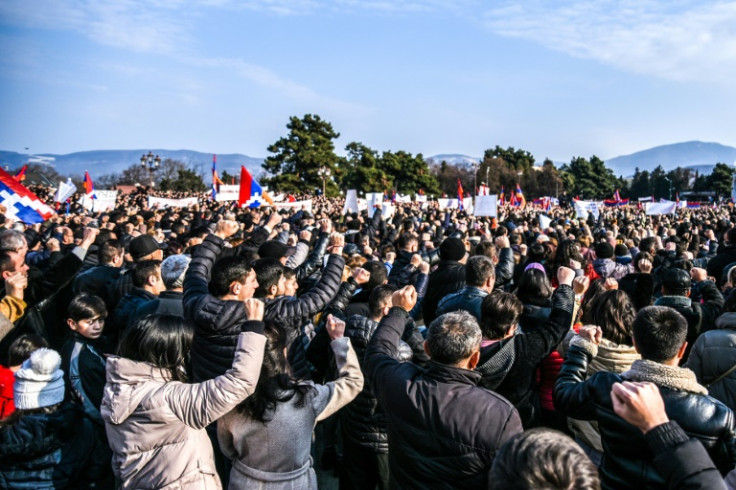Thousands Rally In Nagorno-Karabakh To Protest Land Blockade

Thousands rallied on Sunday in Azerbaijan, in the Nagorno-Karabakh region's largest city Stepanakert, to protest the blockade of the only land link to Armenia, an AFP journalist saw.
Baku and Yerevan fought two wars -- in 2020 and in the 1990s -- over the contested region of Nagorno-Karabakh, an Armenian-populated enclave of Azerbaijan.
For nearly two weeks Azerbaijani activists have blocked the Lachin corridor, the only land link to Armenia, to protest what they claim is illegal mining.
Yerevan has accused Baku of staging demonstrations and creating a humanitarian crisis in the mountainous enclave.
On Sunday, under a bright sun, Stepanakert's main Renaissance Square was flooded with protesters, with a giant Armenian flag hoisted above the crowd.
"We have been under a complete blockade imposed by Azerbaijan, as the only road linking the Artsakh to the outside world is closed," member of the ombudsman's office Mary Asatryan said
using the Armenian name for the breakaway province.
"On this holy Christmas day, we are standing here and call for action, the deliberate blockade of 120,000 people is a crime against humanity," Asatryan said, addressing the crowd on loudspeakers.
The protests went smoothly, an AFP journalist said. Among the attendees was separatist leader Arayik Harutyunyan.
In the crowd, a small girl in a pink coat held a sign that read "Open the 'road of life'".
Others held banners calling for "self-determination" and bearing the slogan "we won't give up".
Armenia's parliament has said Karabakh was suffering from shortages of food, medicine and fuel following the closure of the corridor.
Azerbaijan insists there is no blockade and that civilian cars can move freely to and out of Karabakh.
"There is no basis for the claims that the protests on Lachin pose a threat of humanitarian crisis," Azerbaijan's foreign ministry said in a statement published Sunday.
But residents who spoke to AFP were worried.
"This is the only road that connects Artsakh with the rest of the world. Not only Armenia, we reach the rest of the world through Armenia," 70-year-old Stepanakert resident Donara Gabrielyan told AFP on Saturday.
Armenia and Azerbaijan fought a six-week war in autumn 2020.
The fighting claimed more than 6,500 lives and ended with a Russian-brokered truce that saw Yerevan cede territories it had controlled for decades.
But Moscow is embroiled in a 10-month-long Ukraine offensive, and Armenia has said Russian peacekeepers deployed in the region were failing to prevent the blockade.
Armenia's Nikol Pashinyan and Azerbaijan's Ilham Aliyev are expected at a gathering of the leaders of the post-Soviet sovereign states in Saint Petersburg next week.
But Kremlin spokesman Dmitry Peskov told state-run news agency Interfax Sunday that a tripartite meeting with the Russian president on the sidelines of the summit was "not envisaged".
With Moscow increasingly isolated on the world stage following its February offensive on Ukraine, the United States and the European Union attempted to mediate.
Talks in Brussels planned in December between Yerevan and Baku were cancelled after Azerbaijan accused France of backing Armenia in the decades-long conflict.
Nevertheless, French President Emmanuel Macron called his Azerbaijani counterpart to call for "allowing free movement along the Lachin corridor", according to an Elysee press statement.
When the Soviet Union collapsed in 1991, ethnic Armenian separatists in Nagorno-Karabakh broke away from Azerbaijan. The ensuing conflict claimed around 30,000 lives.


© Copyright AFP {{Year}}. All rights reserved.





















